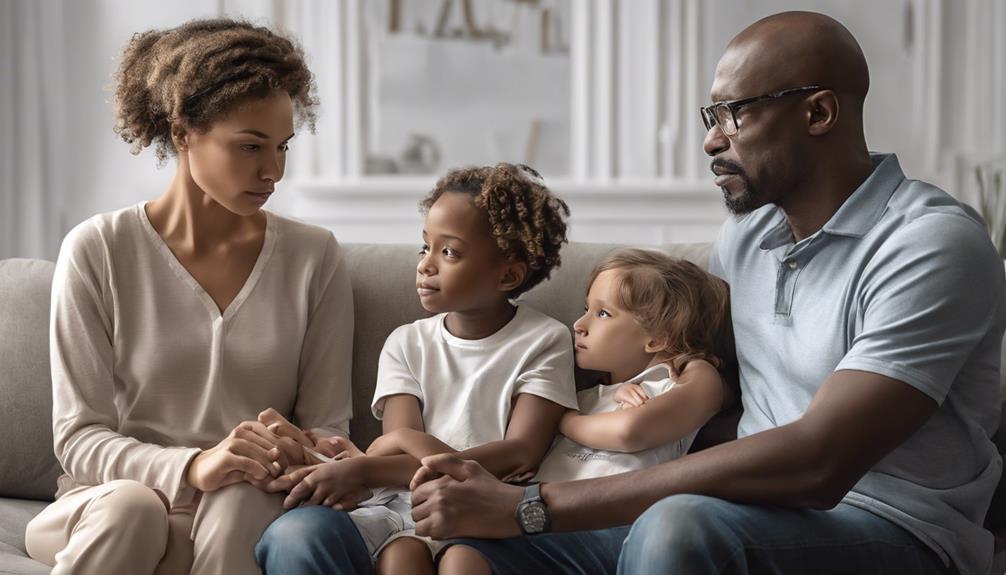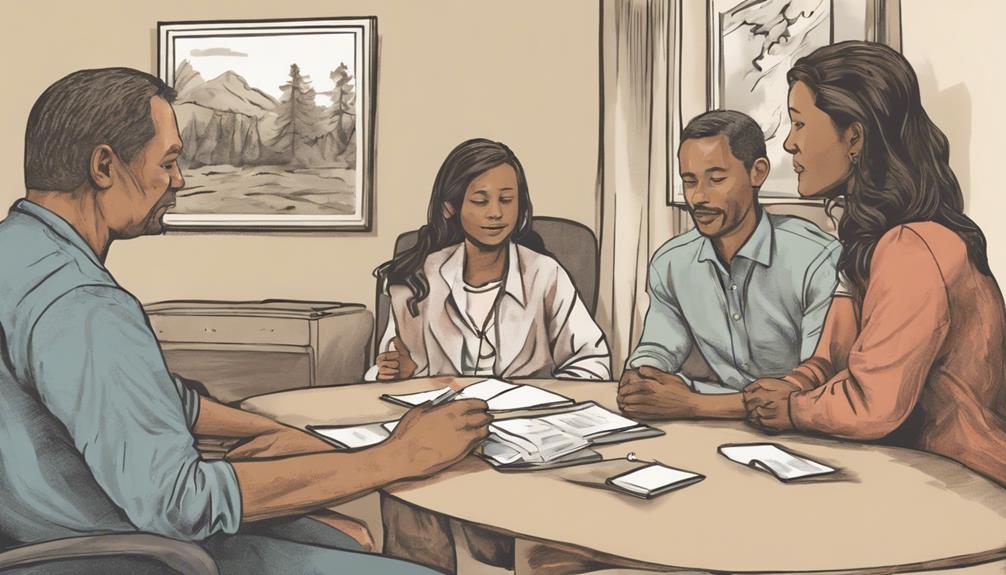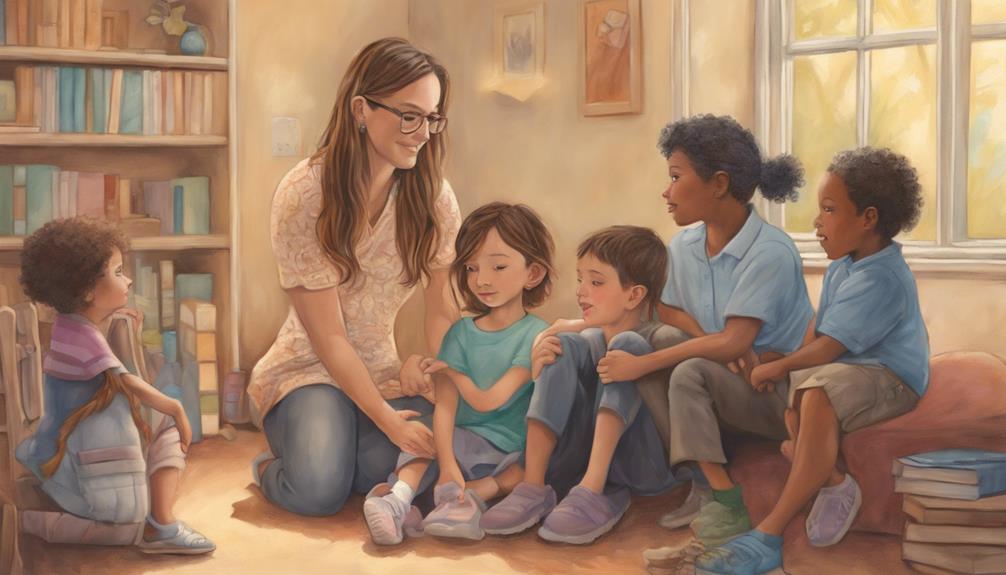When talking to kids about divorce, use simple explanations for ages 0-5. Validate feelings of 6-11 without blame. Promote open talks with 12-14-year-olds. Reassure with age-appropriate books. Create a safe space for emotions. Highlight continual love and support. Guarantee kids know it's not their fault. Explain living changes, visits, and routines. Use their language and offer reassurance. Listen actively, be compassionate, and validate feelings. Consider family counseling for emotional support. Avoid speaking negatively about the other parent. Maintain honesty, avoid involving kids in conflicts, and seek professional help if needed. More helpful tips await exploration.
Key Takeaways
- Provide simple explanations without blaming.
- Encourage open discussions based on age.
- Reassure children of ongoing love and support.
- Avoid involving children in parental conflicts.
- Seek professional support for emotional challenges.
Age-Appropriate Communication Strategies
To effectively communicate with children about divorce, parents should employ age-appropriate strategies tailored to the child's developmental stage and emotional maturity.
For children aged 0 to 5, providing simple explanations about who's moving out and where the child will live can help them grasp the concept of divorce. This age group benefits from reassurance and consistency in their routines to feel secure during the adjustment.
Parents of 6 to 11-year-olds should acknowledge their feelings of fear, anger, or sadness without placing blame on the child. Reassuring them that they aren't at fault is vital for their emotional well-being.
When addressing 12 to 14-year-olds, encouraging open discussions can enhance their understanding of divorce-related issues. Respecting their need for independence while offering support is key at this stage. Using age-appropriate books about divorce can also aid children in processing their emotions and adjusting to the changes in their family dynamic.
Importance of Reassurance

Reassurance plays an important role in helping children understand that divorce isn't their fault. By providing comfort, parents can create a safe space for children to express feelings of sadness or confusion. Emphasizing continued parental love and support can help ease children's fears during the adjustment. Assuring children of ongoing care and affection can also help them cope with the changes that come after divorce.
This reassurance maintains a sense of stability and security for children during a challenging time. It's significant for parents to consistently remind their children that the divorce isn't a result of anything they did or didn't do. Reassurance helps children feel loved, supported, and secure as they navigate the complexities of divorce.
Parents should aim to be open, honest, and reassuring in their communication with their children to help them feel more at ease during this difficult period.
Sharing Basic Information

When explaining divorce to children, parents should clearly outline the upcoming changes in their living situation, visitation schedules, and daily routines. It's important to specify the new living arrangements and how often the child will see each parent. Mentioning any alterations in daily routines, such as who'll pick them up from school or where they'll spend weekends, helps children anticipate what to expect.
However, it's vital to strike a balance and not overwhelm them with unnecessary details. Using language appropriate for their age, parents should explain the divorce process and its effects on their lives. Reassurance is essential; children need to know they'll still be loved and supported by both parents even though things are changing.
Empathy and Understanding

Moving from discussing basic information about the divorce to focusing on empathy and understanding, parents must actively listen to their children's emotions and perspectives to provide the necessary support during this challenging time. Empathy plays a pivotal role in helping kids feel understood and supported. By understanding children's feelings of fear, sadness, or anger, parents can show compassion and create a safe space for open communication.
Acknowledging these emotions without judgment fosters trust and allows children to express themselves freely. Demonstrating empathy is essential for children to feel valued and heard amid the difficulties of divorce. It's important for parents to be attentive to their children's emotional cues, validate their experiences, and offer reassurance.
Family Counseling Benefits

Family counseling offers a vital support system for families going through divorce. It helps children and parents navigate the emotional challenges that arise. It provides a safe environment where families can openly communicate and address concerns together.
Professional guidance in family counseling equips families with tools and strategies to enhance communication and understanding. This aid in a smoother shift post-divorce.
Importance of Counseling
How can family counseling benefit children during the process of divorce?
Family counseling provides a safe environment for children to express their emotions and understand the changes occurring within their family. It helps kids navigate the emotional repercussions of divorce and equips parents with effective communication and co-parenting strategies. Professional counseling addresses behavioral and mental health issues that may arise due to the divorce, promoting healing and strengthening familial bonds.
Seeking counseling support aids children in adjusting to the new family structure post-divorce, fostering resilience and aiding in the healing process. Family counseling plays an important role in providing children with the tools and support they need to cope with the challenges of divorce and navigate this significant life change.
Emotional Support for Kids
Seeking emotional support through family counseling can provide children with a safe space to express their feelings and develop coping strategies during the challenges of divorce.
Professional guidance in family counseling can help kids navigate the complexities of divorce and equip them with tools to manage their emotions. Counseling sessions can facilitate improved communication between parents and children, fostering understanding and support.
By participating in family counseling, children can feel validated and empowered to voice their fears and concerns in a supportive environment. This process can assist kids in processing their emotions and adjusting to the changes brought about by divorce.
Family counseling offers a valuable opportunity for children to receive emotional support and develop resilience during this challenging time.
Communication Tools and Strategies
Developing effective communication tools and strategies through family counseling benefits parents and children maneuvering the challenges of divorce. Professional guidance in family counseling helps tailor communication approaches to the family's unique needs and circumstances.
It provides a safe environment for addressing children's emotional concerns and aiding them in coping with divorce-related changes. By facilitating open discussions and conflict resolutions, family counseling supports a smoother shift after divorce.
Additionally, it assists in rebuilding trust, nurturing healthy relationships, and enhancing the overall well-being of both parents and children. Family counseling serves as an essential resource in equipping families with the necessary skills to navigate the complexities of divorce while fostering understanding and cooperation during this challenging time.
Avoiding Negative Talk

When talking to kids about divorce, it's essential to avoid criticizing the other parent in their presence. Negative talk can harm their emotional well-being and create unnecessary stress.
Instead, focus on positive communication strategies, emphasizing love and support, and maintaining an open dialogue to help them navigate this challenging time.
Positive Communication Strategies
To foster a healthy post-divorce environment for children, parents should refrain from engaging in negative talk or behaviors about the other parent in their presence. Criticizing or speaking poorly about the ex-spouse can harm the co-parenting relationship and create emotional distress for the children.
It's vital to avoid putting children in a position where they feel pressured to choose sides or become involved in communication between the parents. Maintaining honesty and trust is essential, so parents shouldn't lie or make false promises about the divorce situation.
Additionally, using children as messengers or to gather information about the other parent should be avoided. Negative nonverbal cues or behaviors towards the ex-spouse in front of the children can also have a detrimental impact on the post-divorce environment.
Emphasizing Love and Support
Highlighting love and support for children during a divorce is vital for preserving their emotional well-being and stability. It's important to avoid criticizing or speaking negatively about the other parent in front of the children. Negative talk can create a toxic environment and cause emotional harm.
Refrain from making children choose sides or involving them in conflicts between parents to prevent additional stress. Instead, focus on reassuring children of parental love and support, emphasizing that the divorce isn't their fault. Don't use children to gather information about the ex-spouse or to convey messages, as this can lead to unnecessary tension.
Maintaining Open Dialogue
Maintaining open dialogue while avoiding negative talk about the other parent is essential for fostering a healthy environment for children during a divorce. It's vital to refrain from criticizing the other parent in front of the children to preserve a positive atmosphere.
Additionally, avoid involving children in parental communication or conflicts to shield them from unnecessary stress. Steer clear of using children as messengers between divorced parents to prevent emotional strain.
Making children choose sides between parents should be avoided to prevent feelings of guilt and confusion. Lastly, displaying negative nonverbal cues about the ex-spouse in front of the children should be avoided to promote a healthy co-parenting relationship.
Honesty and Truthfulness

Emphasizing honesty and truthfulness is vital when discussing divorce with children to establish a foundation of trust and understanding. By being truthful, parents can help children comprehend the situation better, reducing any confusion that may arise. Avoiding false promises or lies is essential as it maintains transparency and fosters a healthy parent-child relationship. Truthfulness reassures children that they can rely on their parents for accurate information, creating a sense of security during a tumultuous time.
To convey the importance of honesty and truthfulness effectively, parents can consider the following points:
| Dos | Don'ts | Impact |
|---|---|---|
| Be honest about the reasons | Avoid blaming the other parent | Builds trust and credibility in the parent-child relationship |
| Provide age-appropriate information | Make false promises about reconciliation | Helps children understand the situation better |
| Answer questions truthfully | Hide information or lie | Reduces confusion and uncertainty |
Seeking Professional Support

When discussing divorce with children, seeking professional support can be instrumental in helping them manage the emotional challenges effectively. Consulting with a child psychologist or mental health professional can provide guidance and strategies for maneuvering the process. Professional help can aid in addressing children's fears, concerns, and questions about the divorce.
Family counseling services can assist in creating a smoother shift for children during the divorce. Utilizing available resources like Healing Hearts@Fei Yue for assistance can offer valuable support and guidance for children and families.
Seeking professional support can play an essential role in helping children cope with the changes and uncertainties that come with divorce. By accessing the expertise and guidance of trained professionals, children can better understand their emotions, communicate their feelings, and develop healthy coping mechanisms. Professional support can provide a safe space for children to express themselves and receive the necessary assistance to manage this challenging period with resilience and strength.
Frequently Asked Questions
What Not to Tell Your Kids About Divorce?
When discussing divorce with kids, parents should avoid sharing financial or legal details, blaming the other parent, involving children in adult matters, using them as messengers, or speaking negatively about the ex-spouse.
At What Age Is a Child Most Affected by Divorce?
Children are most affected by divorce during adolescence. Teens' advanced understanding of relationships and identity can lead to intense emotional reactions. While younger kids may struggle with changes, teens face unique challenges in adjusting to divorce.
How Do You Tell Kids You're Divorcing?
When telling kids about divorce, parents should have a calm and honest conversation, using age-appropriate language. Reassure the child it's not their fault and both parents will continue to love and support them.
Should You Be Honest With Your Kids About Divorce?
Being truthful with kids about divorce is essential. It fosters trust and understanding long-term. Truthfulness helps children process the situation, reducing confusion and betrayal. Age-appropriate information should be shared openly to help kids navigate changes effectively.
Conclusion
To sum up, when talking to kids about divorce, remember to keep it age-appropriate and reassuring. Avoid negative talk and seek professional support if needed. Remember, honesty is key, but a little white lie about where their favorite toy went won't hurt.
Just kidding, honesty is always the best policy. But seriously, communication is key, so approach the situation with empathy, understanding, and a touch of humor to lighten the mood. Just don't make divorce the punchline.










